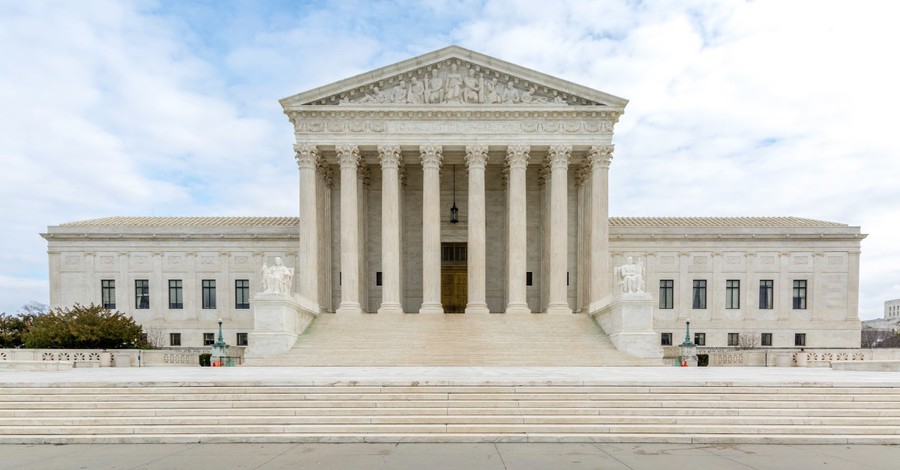
The U.S. Supreme Court Monday turned down a much-watched case involving a county clerk who opposed same-sex marriage, although two of the justices criticized the U.S. legal system for suggesting Christians with traditional beliefs are bigots.
“By choosing to privilege a novel constitutional right over the religious liberty interests explicitly protected in the First Amendment, and by doing so undemocratically, the Court has created a problem that only it can fix,” Justice Clarence Thomas wrote in a four-page statement that was joined by Justice Samuel Alito.
The case involved Kim Davis, a Kentucky county clerk and a professing Christian who ordered her department in 2015 to stop issuing marriage licenses, shortly after the U.S. Supreme Court legalized same-sex marriage nationwide.
Although Davis’ order applied to all couples – and not just to same-sex couples – she was nevertheless sued by those who were refused licenses. Davis had requested an accommodation that did not require her name to be placed on the license of a same-sex couple, due to her strong Christian beliefs. (The state’s executive branch eventually honored her request.)
She lost in district court and at the U.S. Sixth Circuit Court of Appeals, and then appealed to the U.S. Supreme Court. Liberty Counsel, which represented Davis, argued she had the legal right under Supreme Court precedent to stop issuing marriage licenses.
Thomas and Alito, in their Monday statement, said the Supreme Court created the problem by legalizing same-sex marriage and bypassing the “democratic process.”
“Several Members of the Court noted that the Court’s decision would threaten the religious liberty of the many Americans who believe that marriage is a sacred institution between one man and one woman,” Thomas wrote, referring to an argument he and Chief Justice John Roberts made in 2015. “If the States had been allowed to resolve this question through legislation, they could have included accommodations for those who hold these religious beliefs.
“... Worse still, though it briefly acknowledged that those with sincerely held religious objections to same-sex marriage are often ‘decent and honorable,’ the Court went on to suggest that those beliefs espoused a bigoted worldview.”
Thomas noted that the high court, in its 2015 Obergefell v. Hodges decision legalizing same-sex marriage, said traditional views of marriage are “demean[ing]” to gays and lesbians and impose “stigma and injury.” Thomas and Alito dissented in the 2015 decision.
“The dissenting Justices predicted that ‘[t]hese ... assaults on the character of fair-minded people will have an effect, in society and in court,’ allowing ‘governments, employers, and schools’ to ‘vilify’ those with these religious beliefs ‘as bigots,’ Those predictions did not take long to become reality,” Thomas wrote.
Davis, Thomas wrote, “found herself faced with a choice between her religious beliefs and her job.”
“Davis may have been one of the first victims of this Court’s cavalier treatment of religion in its Obergefell decision, but she will not be the last. Due to Obergefell, those with sincerely held religious beliefs concerning marriage will find it increasingly difficult to participate in society without running afoul of Obergefell and its effect on other antidiscrimination laws,” he wrote.
The Obergefell decision, Thomas wrote, “enables courts and governments” to “brand religious adherents who believe that marriage is between one man and one woman as bigots.” This, in turn, makes “their religious liberty concerns that much easier to dismiss.”
Thomas referenced a Sixth Circuit judge who described Davis’ religious beliefs as “anti-homosexual animus.”
“In other words, Obergefell was read to suggest that being a public official with traditional Christian values was legally tantamount to invidious discrimination toward homosexuals,” Thomas wrote.
He referenced several recent court decisions and said individuals “have continually attempted to label people of goodwill as bigots merely for refusing to alter their religious beliefs in the wake of prevailing orthodoxy” as stated in Obergefell.
Until the Supreme Court makes a correction and issues accommodations, Obergefell will continue to have “ruinous consequences for religious liberty,” Thomas wrote.
Photo courtesy: ©Getty Images/Brian PIrwin
Michael Foust has covered the intersection of faith and news for 20 years. His stories have appeared in Baptist Press, Christianity Today, The Christian Post, the Leaf-Chronicle, the Toronto Star and the Knoxville News-Sentinel.










